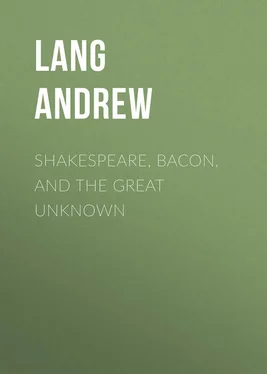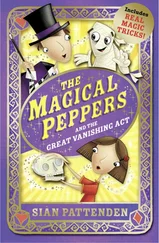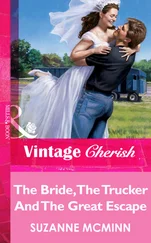Andrew Lang - Shakespeare, Bacon, and the Great Unknown
Здесь есть возможность читать онлайн «Andrew Lang - Shakespeare, Bacon, and the Great Unknown» — ознакомительный отрывок электронной книги совершенно бесплатно, а после прочтения отрывка купить полную версию. В некоторых случаях можно слушать аудио, скачать через торрент в формате fb2 и присутствует краткое содержание. Жанр: foreign_antique, foreign_prose, на английском языке. Описание произведения, (предисловие) а так же отзывы посетителей доступны на портале библиотеки ЛибКат.
- Название:Shakespeare, Bacon, and the Great Unknown
- Автор:
- Жанр:
- Год:неизвестен
- ISBN:нет данных
- Рейтинг книги:4 / 5. Голосов: 1
-
Избранное:Добавить в избранное
- Отзывы:
-
Ваша оценка:
- 80
- 1
- 2
- 3
- 4
- 5
Shakespeare, Bacon, and the Great Unknown: краткое содержание, описание и аннотация
Предлагаем к чтению аннотацию, описание, краткое содержание или предисловие (зависит от того, что написал сам автор книги «Shakespeare, Bacon, and the Great Unknown»). Если вы не нашли необходимую информацию о книге — напишите в комментариях, мы постараемся отыскать её.
Shakespeare, Bacon, and the Great Unknown — читать онлайн ознакомительный отрывок
Ниже представлен текст книги, разбитый по страницам. Система сохранения места последней прочитанной страницы, позволяет с удобством читать онлайн бесплатно книгу «Shakespeare, Bacon, and the Great Unknown», без необходимости каждый раз заново искать на чём Вы остановились. Поставьте закладку, и сможете в любой момент перейти на страницу, на которой закончили чтение.
Интервал:
Закладка:
Of course there is not!
“In fact, there are some reasons why one should attribute the legal assistance, say, to Coke, rather than to Bacon.”
The truth is, that Bacon seems not to have been lawyer enough for Will’s purposes. “We have no reason to believe that Bacon was particularly well read in the technicalities of our law; he never seems to have seriously followed his profession.” 1 1 E. J. Castle, Shakespeare , Bacon , Jonson , and Greene , pp. 194–195.
Now we have Mr. Greenwood’s testimonial in favour of Mr. Castle, “Who really does know something about law.” 2 2 The Shakespeare Problem Restated , p. 145.
Mr. Castle thinks that Bacon really did not know enough about law, and suggests Sir Edward Coke, of all human beings, as conceivably Will’s “coach” on legal technicalities. Perhaps Will consulted the Archbishop of Canterbury on theological niceties?
Que sçais je ? In some plays, says Mr. Castle, Will’s law is all right, in other plays it is all wrong. As to Will’s law, when Mr. Greenwood and Mr. Castle differ, a layman dare not intervene.
Concerning legend and tradition about our Will, it seems that, in each case, we should do our best to trace the Quellen , to discover the original sources, and the steps by which the tale arrived at its late recorders in print; and then each man’s view as to the veracity of the story will rest on his sense of probability; and on his bias, his wish to believe or to disbelieve.
There exists, I believe, only one personal anecdote of Will, the actor, and on it the Baconians base an argument against the contemporary recognition of him as a dramatic author. I take the criticism of Mr. Greenwood (who is not a Baconian). One John Manningham, Barrister-at-Law, “a well-educated and cultured man,” notes in his Diary (February 2, 1601) that “at our feast we had a play called Twelve Night or What you Will, much like the Comedy of Errors, or Menæchmi in Plautus, but most like and near to that in Italian called Inganni .” He confides to his Diary the tricks played on Malvolio as “a good practice.” 3 3 The Shakespeare Problem Restated , p. 340.
That is all.
About the authorship he says nothing: perhaps he neither knew nor cared who the author was. In our day the majority of people who tell me about a play which they have seen, cannot tell me the name of the author. Yet it is usually printed on the playbill, though in modest type. The public does not care a straw about the author’s name, unless he be deservedly famous for writing letters to the newspapers on things in general; for his genius as an orator; his enthusiasm as a moralist, or in any other extraneous way. Dr. Forman in his queer account of the plot of “Mack Beth” does not allude to the name of the author (April 20, 1610). Twelfth Night was not published till 1623, in the Folio: there was no quarto to enlighten Manningham about the author’s name. We do not hear of printed playbills, with author’s names inserted, at that period. It seems probable that occasional playgoers knew and cared no more about authors than they do at present. The world of the wits, the critics (such as Francis Meres), poets, playwrights, and players, did know and care about the authors; apparently Manningham did not. But he heard a piquant anecdote of two players and (March 13, 1601) inserted it in his Diary.
Shakespeare once anticipated Richard Burbage at an amorous tryst with a citizen’s wife. Burbage had, by the way, been playing the part of Richard III. While Will was engaged in illicit dalliance, the message was brought (what a moment for bringing messages!) that Richard III was at the door, and Will “caused return to be made that William the Conqueror was before Richard III. Shakespeare’s name William .” (My italics.) Mr. Greenwood argues that if “Shakspere the player was known to the world as the author of the plays of Shakespeare, it does seem extremely remarkable” that Manningham should have thought it needful to add “Shakespeare’s name William.” 4 4 The Shakespeare Problem Restated , pp. 340, 341.
But was “Shakspere,” or any man, “known to the world as the author of the plays of Shakespeare”? No! for Mr. Greenwood writes, “nobody, outside a very small circle, troubled his head as to who the dramatist or dramatists might be.” 5 5 In Re Shakespeare , p. 54.
To that “very small circle” we have no reason to suppose that Manningham belonged, despite his remarkable opinion that Twelfth Night resembles the Menæchmi . Consequently, it is not “extremely remarkable” that Manningham wrote “Shakespeare’s name William,” to explain to posterity the joke about “William the Conqueror,” instead of saying, “the brilliant author of the Twelfth Night play which so much amused me at our feast a few weeks ago.” 6 6 The Shakespeare Problem Restated , p. 341.
“Remarkable” out of all hooping it would have been had Manningham written in the style of Mr. Greenwood. But Manningham apparently did not “trouble his head as to who the dramatist or dramatists might be.” “Nobody, outside a very small circle,” did trouble his poor head about that point. Yet Mr. Greenwood thinks “it does seem extremely remarkable” that Manningham did not mention the author.
Later, on the publication of the Folio (1623), the world seems to have taken more interest in literary matters. Mr. Greenwood says that then while “the multitude” would take Ben Jonson’s noble panegyric on Shakespeare as a poet “ au pied de la lettre ,” “the enlightened few would recognise that it had an esoteric meaning.” 7 7 Ibid. , p. 470.
Then, it seems, “the world” – the “multitude” – regarded the actor as the author. Only “the enlightened few” were aware that when Ben said “Shakespeare,” and “Swan of Avon,” he meant – somebody else.
Quite different inferences are drawn from the same facts by persons of different mental conditions. For example, in 1635 or 1636, Cuthbert Burbage, brother of Richard, the famous actor, Will’s comrade, petitioned Lord Pembroke, then Lord Chamberlain, for consideration in a quarrel about certain theatres. Telling the history of the houses, he mentions that the Burbages “to ourselves joined those deserving men, Shakspere, Heminge, Condell, Phillips and others.” Cuthbert is arguing his case solely from the point of the original owners or lease-holders of the houses, and of the well-known actors to whom they joined themselves. Judge Webb and Mr. Greenwood think that “it does indeed seem strange.. that the proprietor[s] of the playhouses which had been made famous by the production of the Shakespearean plays, should, in 1635 – twelve years after the publication of the great Folio – describe their reputed author to the survivor of the Incomparable Pair, as merely a ‘man-player’ and ‘a deserving man.’” Why did he not remind the Lord Chamberlain that this “deserving man” was the author of all these famous dramas? Was it because he was aware that the Earl of Pembroke “knew better than that”? 8 8 The Shakespeare Problem Restated , p. 339.
These arguments are regarded by some Baconians as proof positive of their case.
Cuthbert Burbage, in 1635 or 1636, did not remind the Earl of what the Earl knew very well, that the Folio had been dedicated, in 1623, to him and his brother, by Will’s friends, Heminge and Condell, as they had been patrons of the late William Shakspere and admirers of his plays. The terms of this dedication are to be cited in the text, later. We all now would have reminded the Earl of what he very well knew. Cuthbert did not.
Читать дальшеИнтервал:
Закладка:
Похожие книги на «Shakespeare, Bacon, and the Great Unknown»
Представляем Вашему вниманию похожие книги на «Shakespeare, Bacon, and the Great Unknown» списком для выбора. Мы отобрали схожую по названию и смыслу литературу в надежде предоставить читателям больше вариантов отыскать новые, интересные, ещё непрочитанные произведения.
Обсуждение, отзывы о книге «Shakespeare, Bacon, and the Great Unknown» и просто собственные мнения читателей. Оставьте ваши комментарии, напишите, что Вы думаете о произведении, его смысле или главных героях. Укажите что конкретно понравилось, а что нет, и почему Вы так считаете.












